The direct selling industry is witnessing a major rise in trends creating a positive impact across the channel. They have entered every business touch point enhancing the potential like the Midas touch.
Emerging technologies, customer preferences, and market shifts have all set a stage for the channel to rise and shine.
Among these ongoing trends are some crucial ones that hold promising opportunities for direct selling businesses to script their success story in 2025.
Discover how we build resilient businesses with advanced MLM functionalities
Elevate your customer experience to align with industry standards
Delivering high standards in customer experience has become an obligatory necessity for brands to ensure optimum customer satisfaction and higher retention. Shift in customer preferences and demands make it a challenge for brands to continuously adapt and align to their needs. However, while operating in a customer-centric era, brands must prioritize delivering quality experience to their customers, whether it be in terms of products or support.
Customer experience in direct selling is distributed across various business domains with pricing standing front of the line. Customers consider pricing an important factor in their purchase decision. With competitively priced products of the same quality already available in the market, it becomes easier for them to choose between alternatives. This is a real challenge for brands to overcome. Accenture, in their recent survey, found that there is an imminent need for companies to balance cost and profit without stressing the customer with price hikes.
Adverse economic conditions have compelled brands to take tougher decisions that seriously impact customer experience. While brands see this as a way for sustenance, customers tag this as greed, consequently eroding their trust and loyalty. If not for product experience, the support brands provide is also highly valued. Customers favor brands that deliver real-time support in addressing their concerns.
47% of customers feel less valued when they face difficulty reaching or talking to unsupportive customer service agents.
Source: Accenture
In the positive side of the story, technological advancements including generative AI, AR, and VR are creating compelling customer experiences. These technologies are creating a more “human-like representation” of the brand by connecting with their customers on a deeper and more personal level.
Leverage generative AI to transform your business processes
The dawn of 2022 witnessed the onset of a new AI innovation that transformed various business functions Generative AI took the center stage generating creative sets of content related to writing, music, images etc. Generative AI uses deep learning to create content based on user prompts.
It has also grown into an industry that has exhibited infinite potential for growth. The generative AI market size is expected to reach an annual growth rate of 46.47% during 2025-2030. This would result in a market volume of $356.1 billion by 2030.
The generative AI market has a projected annual growth rate of 46.47% during 2025-2030.
Source: Statista
Generative AI has been adopted widely by businesses to enhance and ensure effortless success across business processes. This subset of AI has a peculiar capacity to transform almost all business processes in one way or the other. Also, it has impacted businesses in various industries such as healthcare, cosmetics, education, IT etc.
The application of generative AI in the direct selling industry will create new and exciting network marketing business opportunity to enhance customer experience through to enhance customer experience through relevant product recommendations, marketing content creation, and personalization. The Statista survey points out that 37% of marketing professionals have used generative AI to help with their work-related tasks. Distributors can apply generative AI techniques in creating appealing and creative marketing content that aligns rightly with their target audience.
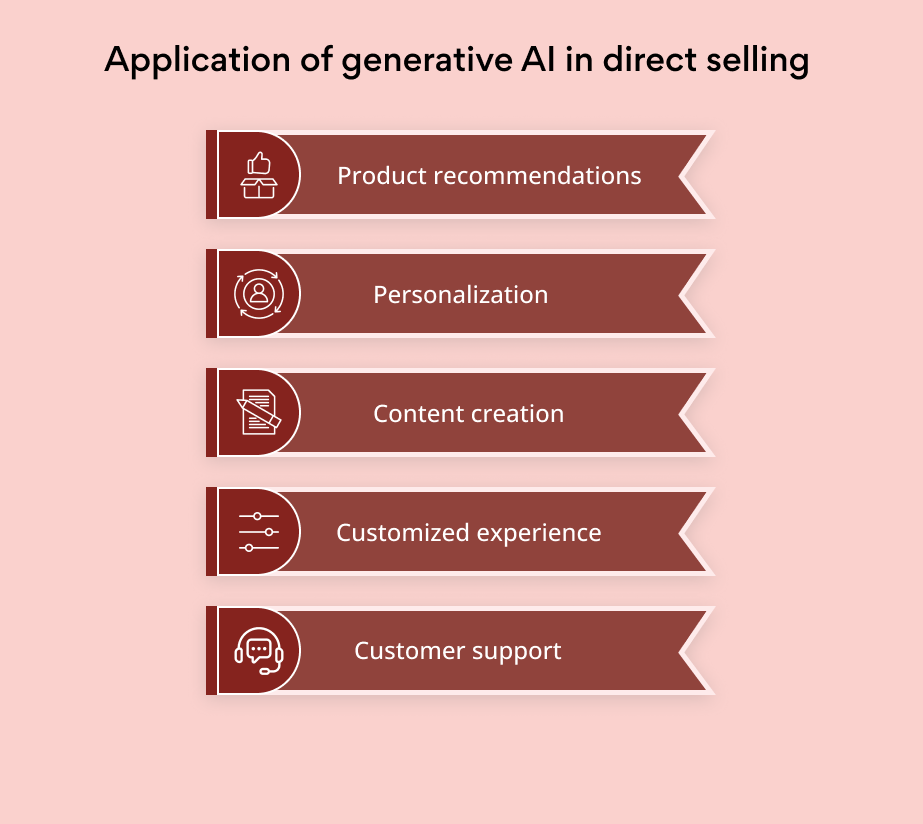
Businesses adapting AI saw an average revenue increase of 6-10%.
Source: Statista
Generative AI is mostly favored by the younger generations. Hence direct selling companies with the majority salesforce belonging to Gen Z must adapt to Gen AI tools to keep pace with the demands of younger generations.
70% of generative AI users belong to Generation Z.
Source: Salesforce Study
Besides generating creative and interesting content for marketing, generative AI can engage customers with meaningful interactions, analyze their sentiments, and take a logical approach to address customer concerns.
Boost your network’s reach with 5G technology
Compared to its forebearers, 5G offers speed, reliability, and faster connectivity. It has accelerated downloads and reduced latency facilitating easier adoption of technologies like AR, VR and IoT. 5G has ushered in a new era of connectivity promising users with a seamless and flexible experience.
Direct sellers can tap into the potential of 5G for improved speed and connectivity in their customer interactions and live product demonstrations.
Direct selling businesses can deliver real-time support for their customers and training for distributors with the reliable connectivity of 5G.
Adopt emerging technologies to outshine competitors
Emerging technologies such as AR, VR, blockchain and IoT are already reigning supreme in the direct selling industry. This is accelerated by the customer demands for interactive and immersive experiences. The user penetration rate of AR and VR is projected to be 52.8% in 2025 and is expected to rise to 55.9% by 2028.
The AR and VR market is expected to grow at an annual rate of 9.64% (CAGR 2025-2028), resulting in a projected market volume of $58.3 billion by 2028.
Source: Statista
Augmented Reality and Virtual Reality are technologies par excellence that deliver interactive and seamless shopping experience for customers. Direct selling brands who have capitalized on these technologies have garnered much attention and success.
Mary Kay redefined the online shopping experience of their customers and independent consultants with the launch of Suite 13TM which is a virtual reality shop that showcases their product catalogs and company history.
Practical application of blockchain in direct selling will reinforce trust and transparency in the processes where it is applied. Data and transactions in a decentralized blockchain network cannot be altered or manipulated thereby ensuring optimum security for data in transit and financial transactions.
In the larger picture, blockchain can help in securing customer data against unauthorized access or tampering. Direct selling companies can rely on the capabilities of blockchain to enhance privacy and align with data security policies of various countries in operation.
The self-executing smart contracts that run on blockchain-powered platforms eliminate the need for intermediaries. Direct selling companies can use smart contracts to automate distributor onboarding and registration process with transparency.
Explore new avenues for growth in ecommerce
Ecommerce has been a surging trend since the pandemic, and the interest has not subsided even in the post pandemic era. The reason, obviously, is the convenience and flexible shopping experience it offers.
Several other micro trends that cropped up inside ecommerce have also maintained its status as an ongoing trend. Personalized product recommendations and customization options are voted the highest by consumers worldwide in addition to voice search, AI-assisted cross-selling and upselling, and multichannel customer support. This has evidently been one of the factors influencing customer decisions when choosing a brand.
While AR and VR have been leading the charge in delivering exceptional customer experiences, blockchain ensures supply chain transparency with improved communication.
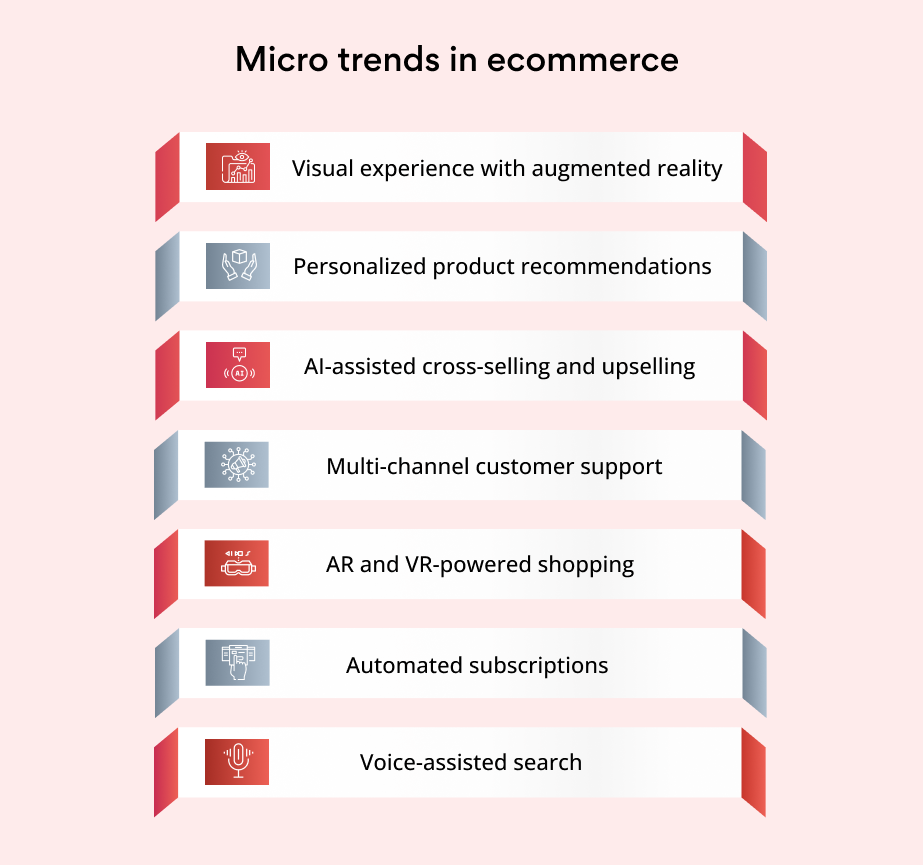
Retail ecommerce sales in 2024 is projected to surpass $6.3 trillion worldwide. Now or never is the time for direct selling companies to revamp their ecommerce strategies to better build their brand and their business. With the growing relevance of AI, direct selling businesses need to focus on customer demands toward personalization, customization, and automation in ecommerce.
Lead the charge in sustainable practices
Sustainability first entered the sphere of human life as a concept that encourages individuals and organizations to do their bit for the environment and the planet. It has slowly crept into the corporate sphere, becoming more of an obligation rather than just a fancy trend. It has found a prominent place in the CSR initiatives of organization and more important of all, it has become a factor that differentiates a brand in competition.
Customer perceptions of brands that contribute overly to sustainability initiatives are positive and favorable than brands that don’t. Younger generations are keener on brands that prioritize sustainability in every step of their business. Generation Z is rightly referred to as the sustainability generation for the interest they place on sustainable initiatives.
In direct selling, sustainability and net zero concepts, are taken seriously by brands as a part of their commitment and dedication to the wellbeing of their community. The popular direct selling brand, Nu Skin, joined hands with the EcoBeautyScore Consortium to assess the environmental impact of beauty products. Several other top direct selling companies have showcased their commitment to the planet and the community through various sustainability initiatives.
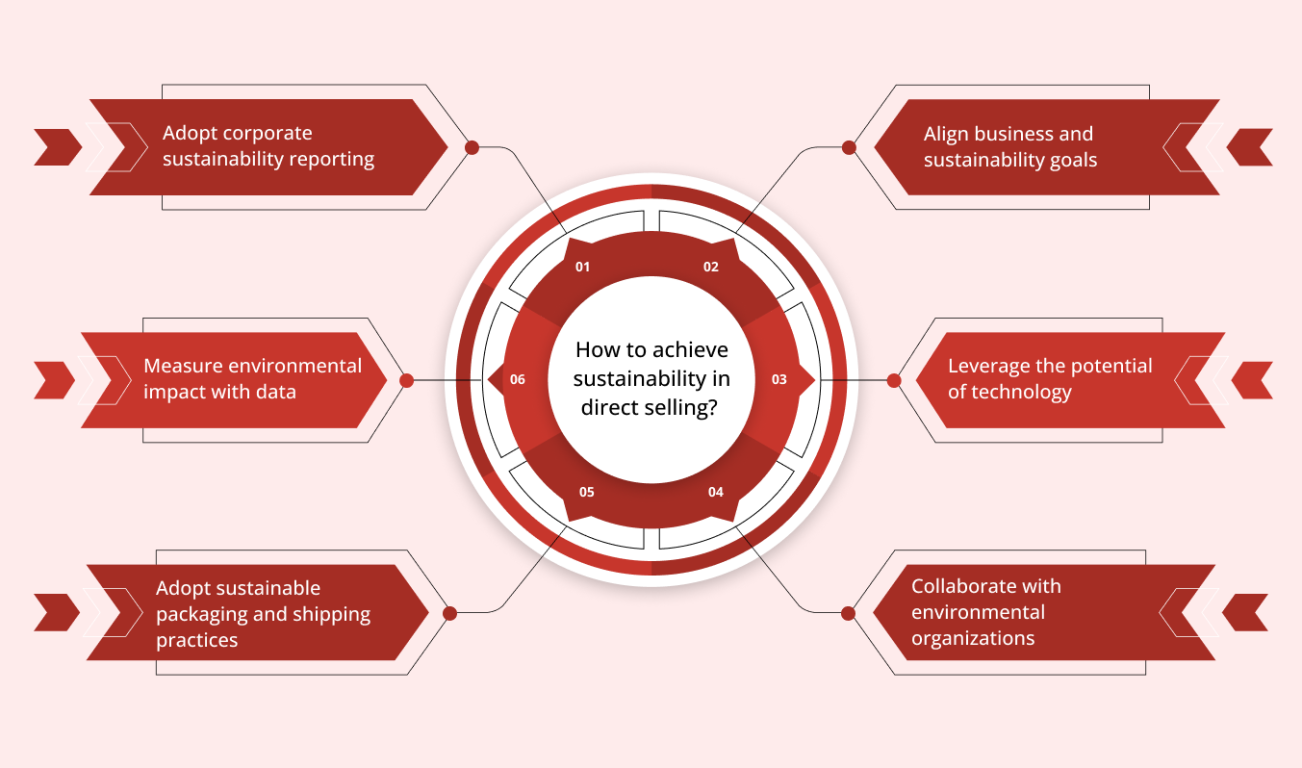
Direct selling businesses can embrace sustainability across their business processes and among their stakeholders through strategic initiatives in the fields of product manufacturing, packaging and shipping. Companies and their distributor teams can utilize technology to hold virtual meetings to reduce carbon emissions and fuel consumption.
Adopt remote work to shape future workspaces
Remote work has been long regarded as one of the professional benefits in direct selling. Distributors always have the freedom to choose their own schedule and place of work. The pandemic and related conditions made remote work an even more popular concept. With organizations experiencing cost effectiveness, low employee turnover and increased productivity, this trend is sure to accompany businesses into the future.
Technological advancements complementing this trend has helped organizations effectively and efficiently manage a scattered workforce. Team building and collaboration tools have supported organizations in ensuring adequate support and engagement to an otherwise isolated salesforce.
Build a stronger company culture through diversity, equity, and inclusion
Organizations are increasingly becoming aware of the need to include these values in their corporate culture. People from diverse backgrounds and levels of expertise can boost innovation and bring in creativity through their unique perspectives and experiences. Most organizations are growing keen on presenting their employees with an unbiased and open workplace, where pay is equal, where they are treated with respect and without discrimination, where people feel free to share ideas and insights openly.
According to a recent Pew Research Survey, 56% of employees consider focusing on diversity, equity, and inclusion (DEI) a positive thing. The survey conducted on 4744 US adults reveals surprising facts about how people consider and expect organizations to handle DEI at the workplace.
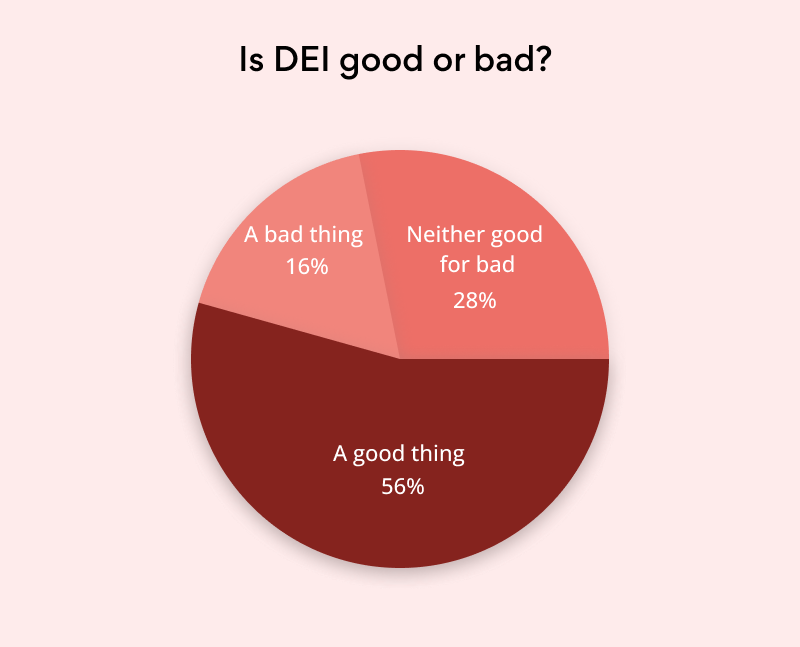
3 in 10 people surveyed admit that it is important to work in a place where there is a mix of ethnicities, age, gender or sexual orientations. The survey found out that being a man or being white has an advantage to becoming successful at the workplace.
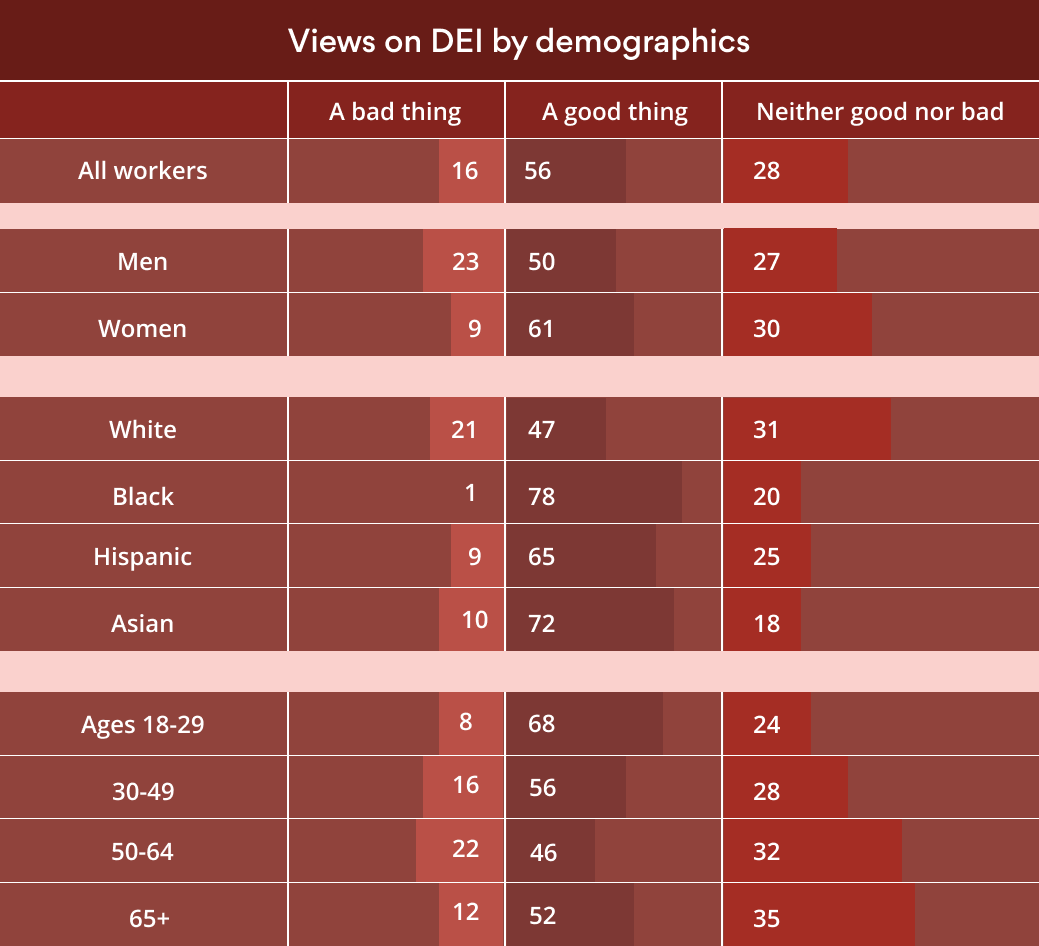
Given the diverse perspectives of various demographics on DEI, what direct selling companies must conclude is that giving the right amount of importance to DEI among distributor teams, customers, and the market can fetch a positive brand image, a happy salesforce, and an army of loyal customers.
Strategically implement DEI to enhance your direct selling business
In product development, direct selling businesses can satisfy the demands of various demographics with products that appeal to different skin tones, hair types, cultural preferences and dietary needs.
Creating inclusive marketing campaigns with models from diverse ethnicities and content that portray various lifestyles, cultures, and identities can feature companies higher on the DEI factor.
Create equal opportunities for distributor teams by providing training programs and support systems that are inclusive and accessible for distributors from all backgrounds.
Engage diverse communities through events that celebrate different cultures, traditions, and identities.
Empower your team with essential soft skills for greater success
Minor to major work-related tasks are getting automated day by day. With an increase in the level of automation, human skills that are core to a business such as critical thinking, problem solving, emotional intelligence, and creativity become invaluable. Especially in direct selling where establishing deeper personal connections are paramount, organizations must invest in upskilling their salesforce every now and then. Constant skill monitoring and enhancements can take them up the ladder, turning it profitable for the brand and the individuals alike.
Technology enhances efficiency. Alright!
But it is the human touch that helps brands in building meaningful connections. Direct selling companies must focus on providing adequate training and support for their distributor teams, helping them to develop on a personal level with individual skills and capabilities.
Explore alternative funding to streamline your financial solutions
Small businesses are heavily relying on alternative funding sources such as alternative lenders, angel investors, Initial Coin Offerings (ICOs), peer-to-peer lending and crowd funding. These are emerging as vital lifelines for small businesses, easing the limitations of traditional funding systems like banks. Alternative funders offer businesses with flexible options including invoice factoring, asset-based lending and revenue-based financing.
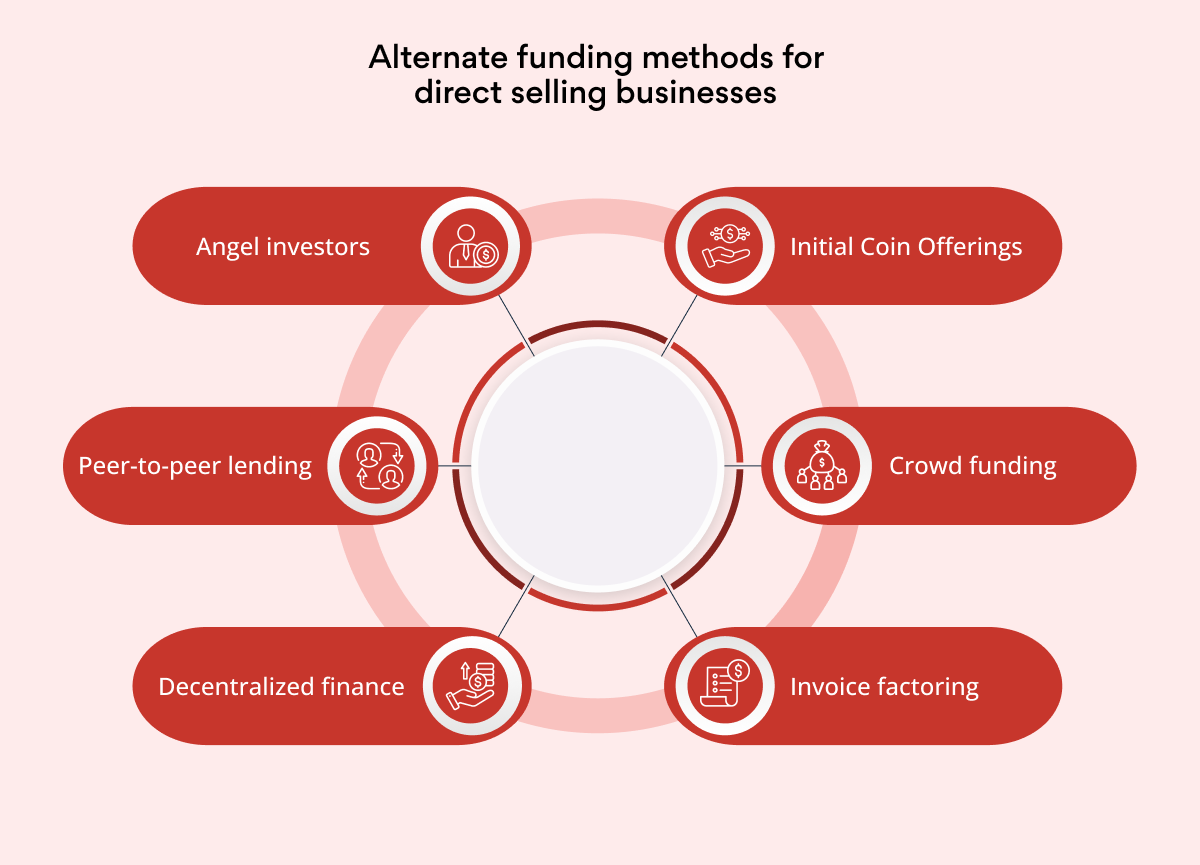
Decentralized Finance (DeFi), a financial technology, is still in its infancy and a growing trend among businesses. DeFi works on decentralized components such as blockchain and cryptocurrencies. It enables peer-to-peer financial transfers without the need for middlemen, making the process faster and transparent.
Small businesses with innovative ideas and potential for higher returns tend to influence investors creating ways for quick funds and investments. Popular methods such as crowd funding make funds easily accessible for small businesses while also building a supportive community. This method has been and continues to be adopted by direct selling businesses around the world. With a community built already, it becomes easier for them to establish their business within the network of like-minded individuals.
Businesses are going to witness major changes across various domains with the onset of these trends. From generating capital for business to ensuring its survival, these trends are becoming a trust factor that brands must align and adapt to.









Leave your comment
Fill up and remark your valuable comment.